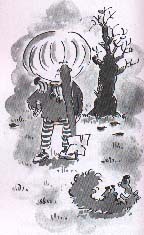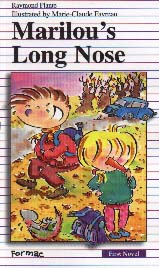|
________________
CM . . . .
Volume VII Number 20 . . . . June 8, 2001
excerpt: (Marilou) grabbed an old cane and began to twirl it dangerously. It thwacked against an old sugar bowl and knocked it off the edge of a table.  One of Marilou's lies, which she insists are "'jokes," results in a sore nose for her friend, Boris. To
get even, Boris suggests a contest: the first in the group "to tell a lie has to wear a big false nose."
The next day, Marilou falls into the trap and must wear the nose to school and face the taunting of
her peers. She wants cute Freddy Busker to notice her, but not for this reason. Her sympathetic
father tells her the story of Cyrano de Bergerac who made up rhymes about his own long nose.
To Marilou's delight, Freddy loves poetry and, guess what? He tells "jokes" too!
One of Marilou's lies, which she insists are "'jokes," results in a sore nose for her friend, Boris. To
get even, Boris suggests a contest: the first in the group "to tell a lie has to wear a big false nose."
The next day, Marilou falls into the trap and must wear the nose to school and face the taunting of
her peers. She wants cute Freddy Busker to notice her, but not for this reason. Her sympathetic
father tells her the story of Cyrano de Bergerac who made up rhymes about his own long nose.
To Marilou's delight, Freddy loves poetry and, guess what? He tells "jokes" too!
Marilou is an appealing character whose dilemma will amuse young readers of this Formac "First Novel." Each attempt to rid herself of the offending nose only gets her more entangled, adding to the humour while raising the tension. Marilou will be admired for her determination and for using her wits to extricate herself, proving that a sense of humour, used wisely, is the best weapon against teasing. There are some inconsistencies in viewpoint, slipping from Boris in the first chapter to Marilou in the second and succeeding chapters. Occasionally other voices intervene as well; the narrator, Marilou's father and Boris again in the fifth chapter. A single viewpoint would reduce confusion at this reading level. The plot moves steadily to a satisfying ending from a friendship standpoint: Marilou and Freddy discover they are kindred spirits when Marilou realizes Freddy's story about having a brown belt in karate isn't true. The lighthearted handling of the issue of lies, "white" or otherwise might prove troublesome for some readers or their parents. Marilou's father casually dismisses her admission to telling "Just little lies you'd hardly notice." There is a danger that this may send mixed signals to youngsters. If the book is used as a read-aloud, this aspect should be discussed. Humourous sketches complement the text. Recommended with Reservations. Living in BC, Gillian Richardson is a former teacher-librarian and a published children's writer of fiction and nonfiction.
To comment on this title or this review, send mail to cm@umanitoba.ca.
Copyright © the Manitoba Library Association.
Reproduction for personal use is permitted only if this copyright notice
is maintained. Any other reproduction is prohibited without
permission.
Published by
TABLE OF CONTENTS FOR THIS ISSUE - June 8, 2001.
AUTHORS |
TITLES |
MEDIA REVIEWS |
PROFILES |
BACK ISSUES |
SEARCH |
ORDER |
CMARCHIVE |
HOME
|
